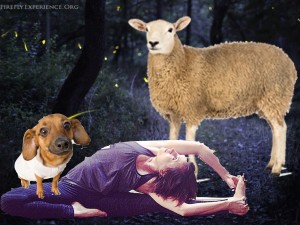Kate Brennan, assistant voice professor and the newest addition to the school of theater faculty, studies several modern styles of voice, theater, and bodywork. She founded the education program at a non-profit theater company, where she serves as artistic director. She also has written two musicals and started her own voice and bodywork style called the Check-In.
Q: Describe your childhood in six words.
A: Philly rowhouse. Lightning bugs til dark.
Q: Tell me about your theatre, BCKSEET Productions.
A: My husband started the company. I’ve been with them for ten years and am now artistic director. This year, the company turned 15. I started the education program, Ignition Education (sticking with the car theme). We’re changing that name to Ignition Education now. Our goal is to highlight people and issues relegated to backseat. We have to alter things now that we’re in OKC. We’re in the drivers seat.
Brennan studied extensively with Kristin Linklater, a Scottish vocal coach, dialect coach, acting teacher, actor, theatre director, and author. She even followed Linklater to Scotland, where she received her Linklater Designation.
Q: While in Scotland, what one thing would you recommend not doing?
A: If you’re on the island, in Orkney, and there’s a gated cow pasture with a bull inside, don’t go in. I didn’t do that. But essentially you’ll get eviscerated, I guess. Also, don’t be alarmed if you run into a lamb in the middle of the street. I was walking with my friend and a lamb showed up in the middle of the road. There were no sheep around. It was very curious. Definitely DO go to the Edinburgh Fringe Festival.
Q: What is the hardest thing you have ever done?
A: Linklater Designation: the voice work I did this summer. You work for a period of time, probably 5-10 years (I was first exposed 15 years ago and started seriously studying it 6-7 years ago). It’s a rigorous process that involves studying with a lot of different master teachers of voice and body work. The tenants of the voice work are fundamentally easy but complicated in practice. You as a person have to evolve to a place where you can manifest the work. For example, I’d be a great swim coach if I knew how to swim well. I can’t be the best teacher unless I can practice what I speak. It’s not just in the classroom. It’s a way of life.
Q: What is the Check-In?
A: When I become interested in things, I study them more. I realized that the collage of items that I had studied – like Linklater voice, Vinyasa yoga, Thai body work, and Phonetic Pillows – were valuable in isolation but even more valuable put together. I invent some of the exercises, but I’m really putting together puzzle pieces in a new way to deal with our world that’s constantly evolving. We have to evolve with it.
Q: What is your favorite yoga pose?
A: Astavakrasana, the 8-angle pose. I haven’t mastered it yet, but I’m getting there.
Q: What is your least favorite show?
A: Every show where the female characters are prostitutes. Do you know how many that is? I have a list on my computer. They do not reflect the women in my life. If the stage representation of women was accurate, 85% of the world’s women would be prostitutes. I can think of 17 shows just off the top of my head.
Q: What are you most proud of?
A: My students.
Q: What is your most prized possession?
A: My dog. I am in no way saying she is a possession, but she’s in my care and most important to me. She’s a Chiweenie named Josephine Baker.
Q: What inspired your original musicals?
A: First, I wrote Some Assembly Required. That was my thesis project during my MFA at University of Virginia. I was studying Laurie Anderson at the time – a performing artist who collages stuff together. I began writing music and scenes to emulate how she worked. I put it together, and it turned out to be a trippy show.
My second show was more linear. I got a writing residency at Wild Acres in North Carolina, where I spent a week in a cabin to write music for ELFuego. That was my answer to the annual Christmas show. You see a lot of the same stuff at Christmas. People go out with families and want something interesting to see. It was a way to sell out but be subversive while doing it. I infused it with my own message about how we are slaves to commercialism and are distracted from the real meaning of Christmas. I wanted to bring Christmas back to what it’s supposed to be about.
Q: Are you working on anything now?
A: I’m working on a few things. I’m 55,000 words into a young adult novel that has to do with dreaming. I also proposed a few things to the department. One is a storytelling piece with music – Angel At Suicide Cliff. It’s a true story about a guy in Australia who lived for 50 years next to The Gap. One person a week commits suicide there, so this man went and asked people in for tea. He saved tons of lives. Another idea, Backlash and Broken Windows, is an art installation. It’s a performance art project about feminism and how the media portrays women.
Q: Mozart or Macklemore?
A: I don’t know who Macklemore is.
Q: What is the worst advice someone has ever told you?
A: One voice teacher told me, “You’ll never have a career or be able to do this essentially.” It was something of that effect, but it wasn’t for lack of talent. She thought I didn’t work in the right way or something. Instead of explaining that to me, she shut me down. I’d leave lessons and cry. A lot of my voice teachers have been extraordinary, but I specifically remember that about her.
Q: What’s the ultimate dream?
A: I would like to open up an arts complex where artists could live, study, and work together. It could also serve as a community liaison to the arts. Students could take lessons – yoga in the morning and poetry reading at night. They could write in the café, and it would be a hub of creativity and wellness. We could bring in performing artists from around the world but also live in a community of artists that could create a better world.
Q: What is one thing you want to tell to every student at OCU?
A: These are not my words, but I live by them: Be the change you want to see in the world. Make sure you attribute that to Gandhi.




Leave a Reply